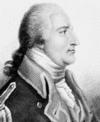- Arnold, Benedict
-
born Jan. 14, 1741, Norwich, Conn.died June 14, 1801, London, Eng.American army officer and traitor.He joined the American Revolutionary army in 1775 and contributed to American victories at the Battle of Ticonderoga, at Fort Stanwix, N.Y., and at the Battle of Saratoga, where he was seriously wounded. He was made a major general and placed in command of Philadelphia, where he lived extravagantly and socialized with wealthy loyalist sympathizers, one of whom he married in 1779. Reprimanded for fiscal irregularities in his command, he began secret overtures to the British. After receiving command of the fort at West Point, N.Y. (1780), he offered to surrender it to the British for £20,000. The plot was uncovered after his British contact, John André, was captured. Arnold escaped on a British ship to England, where he died penniless.
 Benedict Arnold, engraving by H.B. Hall, 1865.Library of Congress, Washington, D.C.
Benedict Arnold, engraving by H.B. Hall, 1865.Library of Congress, Washington, D.C.* * *
▪ American generalborn January 14, 1741, Norwich, Connecticut [U.S.]died June 14, 1801, London, Englandpatriot officer who served the cause of the American Revolution until 1779, when he shifted his allegiance to the British; thereafter his name became an epithet for traitor in the United States.Upon the outbreak of hostilities at Lexington, Massachusetts (April 1775), Arnold volunteered for service and participated with Ethan Allen (Allen, Ethan) in the successful colonial attack on British-held Fort Ticonderoga, New York, the following month. That autumn he was appointed by General George Washington (Washington, George) to command an expedition to capture Quebec. He marched with 700 men by way of the Maine wilderness, a remarkable feat of woodsmanship and endurance, and, reinforced by General Richard Montgomery, attacked the well-fortified city. The combined assault (December 31, 1775) failed, Montgomery was killed, and Arnold was severely wounded.Promoted to the rank of brigadier general, Arnold constructed a flotilla on Lake Champlain and inflicted severe losses on a greatly superior enemy fleet near Valcour Island, New York (October 11, 1776). He returned a hero, but his rash courage and impatient energy had aroused the enmity of several officers. When in February 1777 Congress created five new major generalships, Arnold was passed over in favour of his juniors. Arnold resented this affront, and only Washington's personal persuasion kept him from resigning.Two months later he repelled a British attack on Danbury, Connecticut, and was made a major general, but his seniority was not restored and Arnold felt his honour impugned. Again he tried to resign, but in July he accepted a government order to help stem the British advance into upper New York. He won a victory at Fort Stanwix (now Rome) in August 1777 and commanded advance battalions at the Battle of Saratoga (Saratoga, Battles of) that autumn, fighting brilliantly until seriously wounded. For his services he was restored to his proper relative rank.Crippled from his wounds, Arnold was placed in command of Philadelphia (June 1778), where he socialized with families of loyalist sympathies and lived extravagantly. To raise money, he violated several state and military regulations, arousing the suspicions and, finally, the denunciations of Pennsylvania's supreme executive council. These charges were then referred to Congress, and Arnold asked for an immediate court-martial to clear himself.Meanwhile, in April 1779, Arnold married Margaret (Peggy) Shippen, a young woman of loyalist sympathies. Early in May he made secret overtures to British headquarters, and a year later he informed the British of a proposed American invasion of Canada. He later revealed that he expected to obtain the command of West Point, New York, and asked the British for £20,000 for betraying this post. When his British contact, Major John André (André, John), was captured by the Americans, Arnold escaped on a British ship, leaving André to be hanged as a spy. The sacrifice of André made Arnold odious to loyalists, and his reputation was further tarnished among his former neighbours when he led a raid on New London, Connecticut, in September 1781.At the end of 1781 Arnold went to England, where he remained, inactive, ostracized, and ailing, for the rest of his life.* * *
Universalium. 2010.
